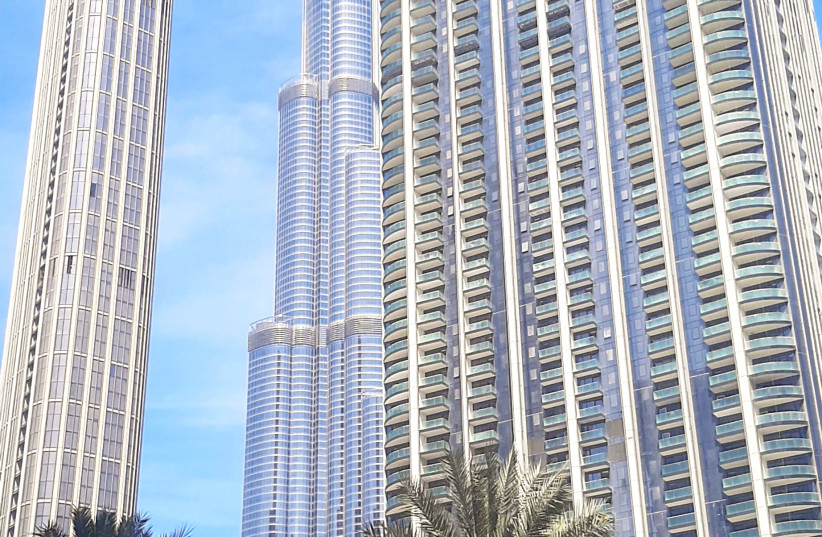Despite the turbulence troubling other parts of the Middle East, the residential housing market in Dubai, the capital of the United Arab Emirates, is continuing to show signs of strong growth. Developers in the UAE are reporting another banner year for Dubai’s housing market, with a surge in sales in 2023 over 2022.
For more stories from The Media Line go to themedialine.org
After the pandemic of 2020-2021, a post-pandemic rebound followed, powered initially by Russian buyers seeking to shield their assets from sanctions imposed on Russia after its invasion of Ukraine in February 2022.
Then, in March this year, the UAE introduced a flexible work permit allowing people with demonstrable skills to take freelance jobs in Dubai. An influx of digital nomads from Europe and North America followed, looking to settle in a tax-free, amenity-rich environment.
Migrants living in Dubai
“There’s so much movement here. So many different opportunities take place in whatever domain you are,” Kevin Tabba, a 24-year-old from Irvine, California, told The Media Line.
“I primarily work in tech, and it’s super easy to access east and west, which is excellent for developing my business,” he said.

Tabba said he had been to buy a two-bedroom condominium in the town of Jebel Ali for $400,000. Such a purchase would not have been possible “in either Los Angeles or Miami,” he said.
Perhaps because of the affordable real estate, Dubai tops global Google searches for places to which to move, ahead of New York or Paris.
For Dora Samoodi, a 39-year-old Iranian, moving to Dubai was a choice to prioritize personal freedoms and tax advantages.
“When you buy a property here, you don’t pay tax on it,” Samoodi told The Media Line. “It's a great place to live. There's a lot of freedom. Women are empowered here. You can do anything. You can work.”
According to the Dubai Land Department, $26.6 billion worth of property was sold in the third quarter of this year, a 40% increase from the same period in 2022. The number of transactions increased 22% from last year, reaching 31,216.
Emaar Properties, the largest luxury property development company in the UAE, reported $7.9 billion in sales in the first nine months of 2023, marking a 25% increase over the same period last year.
“Despite the challenges caused by the pandemic, we persevered and continued to build,” Waleed Mohammad AlZoubi, chairman of the Tiger Group development company, told The Media Line.
“Although the pandemic caused a decline in growth, profits, and business, the UAE remained a global leader in managing the crisis,” he said.
In 2020, annual Tiger Group sales were about $500 million. In the first nine months of 2023 alone, the company, which recently built 19 new towers, sold $1 billion in apartments.
“The massive growth in Dubai is beyond words,” AlZoubi said. “The population has multiplied by three times in the past 20 years, when this area was all sand. Nothing was here before, and very quickly, we developed it.”
AlZoubi said that many wealthy immigrants from the developing world were attracted to the UAE because of its strong pandemic response and digital infrastructure.
“Soon after, we saw more Americans come to Dubai for the same reasons they moved to places like Miami,” he said.
While Russians drove the post-pandemic sales surge that pushed Dubai home prices up about 30% in the past two years, the ruble's decline since then has seen a slowing in demand from Russian buyers.
Tatjana Lescova, Dubai-based associate director of corporate ratings at S&P Global, told The Media Line that she expects the market to cool in the near future.
“Price increases will slow down or decline slightly during the next 12 to 18 months, but I don't expect significant turmoil in the real estate market,” she said.
Akmal Abdelfatah, a professor of civil engineering at the American University of Sharjah, said that new groups of buyers will likely lead to a continued expansion of Dubai’s real estate market.
“I have lived in the city for long enough to see declines quickly reverse,” Abdelfatah told The Media Line. “We’re seeing buyers from India step in now, the way Russians did during the Ukraine war.”
He said the lack of income tax and property tax in Dubai has made the city attractive to people of many nationalities.
